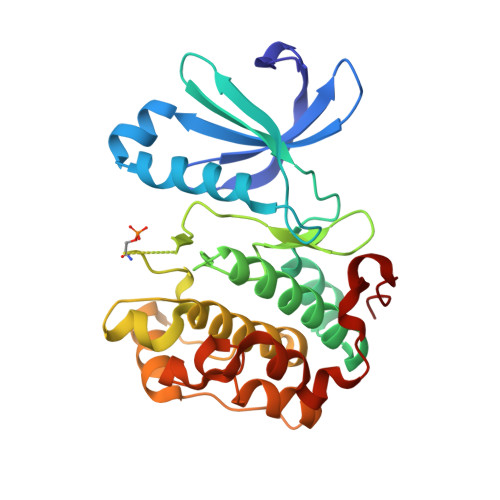Novel small molecule inhibitors of 3-phosphoinositide-dependent kinase-1.
Feldman, R.I., Wu, J.M., Polokoff, M.A., Kochanny, M.J., Dinter, H., Zhu, D., Biroc, S.L., Alicke, B., Bryant, J., Yuan, S., Buckman, B.O., Lentz, D., Ferrer, M., Whitlow, M., Adler, M., Finster, S., Chang, Z., Arnaiz, D.O.(2005) J Biological Chem 280: 19867-19874
- PubMed: 15772071
- DOI: https://doi.org/10.1074/jbc.M501367200
- Primary Citation of Related Structures:
1Z5M - PubMed Abstract:
The phosphoinositide 3-kinase/3-phosphoinositide-dependent kinase 1 (PDK1)/Akt signaling pathway plays a key role in cancer cell growth, survival, and tumor angiogenesis and represents a promising target for anticancer drugs. Here, we describe three potent PDK1 inhibitors, BX-795, BX-912, and BX-320 (IC(50) = 11-30 nm) and their initial biological characterization. The inhibitors blocked PDK1/Akt signaling in tumor cells and inhibited the anchorage-dependent growth of a variety of tumor cell lines in culture or induced apoptosis. A number of cancer cell lines with elevated Akt activity were >30-fold more sensitive to growth inhibition by PDK1 inhibitors in soft agar than on tissue culture plastic, consistent with the cell survival function of the PDK1/Akt signaling pathway, which is particularly important for unattached cells. BX-320 inhibited the growth of LOX melanoma tumors in the lungs of nude mice after injection of tumor cells into the tail vein. The effect of BX-320 on cancer cell growth in vitro and in vivo indicates that PDK1 inhibitors may have clinical utility as anticancer agents.
- Departments of Cancer Research, Berlex Biosciences, Richmond, California 94804, USA. rick_feldman@berlex.com
Organizational Affiliation:





















